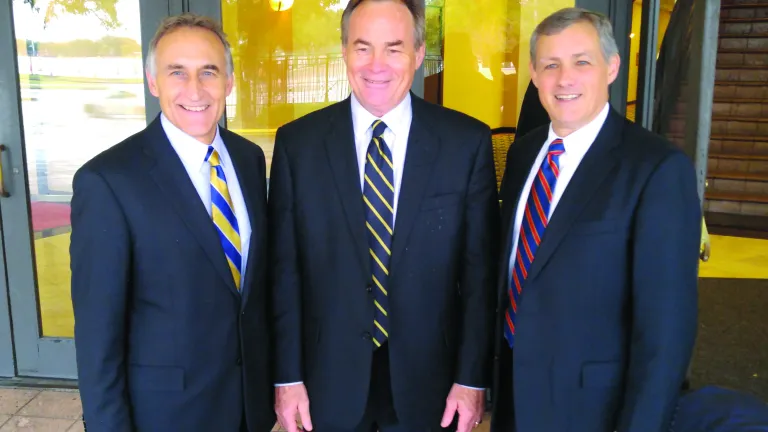Preaching with Conviction and Courage

How do we define the kind of preaching that has been the practice of God's prophets, apostles and Church down through time?
As we look out across the congregations and the churches around us, many styles and topics of preaching echo around our world every week. Preaching is “to proclaim or make known in a sermon… to advocate moral principles, conduct, etc. as right or advisable…” (Webster’s Dictionary).
Which Gospel to be Preached?
Gospel is a Middle English word formed by two words: “good” (which may have sounded more like modern English for “goat”) and “spell,” which in Old English meant “a discourse or message.” What emerges is “go-spell” or gospel; that is, the “good message.” God’s gospel for mankind is the message of salvation leading to eternal life—the good news of the soon-coming Kingdom of God!
Note the words directly inspired by Jesus Christ: “Now after John [the Baptist] was put in prison, Jesus came to Galilee, preaching the gospel of the kingdom of God” (Mark 1:14).
Time and again Jesus Christ commanded His disciples to preach the Kingdom of God: “And this gospel of the kingdom will be preached in all the world as a witness to all the nations, and then the end will come” (Matthew 24:14).
To preach the gospel requires considerable courage in our conviction—often against societal norms. We should be filled with zeal in our preaching and teaching!
Commitment to our calling and the role of Christ’s faithful servants
As preachers and teachers of God’s way of life, Jesus Christ’s ministers and lay members should be totally committed to their sacred duty! Preaching God’s truth is vital in convicting our listeners and readers. “How then shall they call on Him in whom they have not believed? And how shall they believe in Him of whom they have not heard? And how shall they hear without a preacher” (Romans 10:14)?
Furthermore, “the Preacher sought to find acceptable words; and what was written was upright—words of truth” (Ecclesiastes 12:10). Solomon’s reflection becomes our modus operandi. With as much wisdom and power as He may grant to His ministers and members of His Church, we seek God’s true words to preach and teach the gospel of God’s Kingdom.
What is conviction?
God’s Church must live and preach with conviction. The core meaning of conviction (Greek elegcho) is the profound recognition of one’s personal guilt before God. Christ explained that the power of God’s Spirit would “…convict the world of sin, and of righteousness, and of judgment” (John 16:8). As God’s servants, before we can effectively help to convict others of their sins, we must be convicted to the depth of our being—and act on the driving need to faithfully obey.
Before we can effectively help to convict others of their sins, we must be convicted to the depth of our being.
As we humbly yield to Him and to the Father, Christ inspires the process of how we preach and teach the gospel of Jesus Christ and the Kingdom of God—so that it convicts and motivates others to repent, to live God’s way of life, and then through baptism and the laying on of hands become a member of the spiritual Body of Christ. For minister and member alike, this conviction must constantly energize our dedication to Christ and the Father. It enables us to overcome sin and grow toward God’s soon-coming Kingdom.
We, as Christians and preachers of the gospel, must be convicted of a powerful sense of spiritual duty—as was the apostle Paul: “For if I preach the gospel, I have nothing to boast of, for necessity is laid upon me; yes, woe is me if I do not preach the gospel! For if I do this willingly, I have a reward; but if against my will, I have been entrusted with a stewardship. What is my reward then? That when I preach the gospel, I may present the gospel of Christ without charge, that I may not abuse my authority in the gospel” (1 Corinthians 9:16-18).
What is courage?
Courage, in essence, is to keep the true faith and move forward unafraid while boldly proclaiming God’s truth. Joshua naturally had courage, but it grew stronger as God specifically encouraged him to be very courageous (see Joshua 1:7).
With as much wisdom and power as He may grant to His ministers and members of His Church, we seek God's true words to preach and teach the gospel of God's Kingdom.
This is also the essential concept of courage in the New Testament. Note the example of Paul. After his appeal to Caesar, Paul was sent into the custody of soldiers to Rome where he would stand trial before Caesar. The prison voyage faced numerous setbacks, including a shipwreck on Malta, then on to Italy and the long march to Rome. During this time, Paul was even bitten by a deadly viper.
The record implies that Paul was weary and downhearted. Unknown to him, an entourage of brethren from Rome had traveled to meet Paul and his soldier escort at the Appii Forum and Three Inns. “When Paul saw them, he thanked God and took courage” (Acts 28:15).
That encouragement, blessed by God, invigorated Paul. He saw that his work was not in vain. After this, the apostle was in Rome for “two whole years receiving all who came to him, preaching the kingdom of God and teaching the things which concern the Lord Jesus Christ with all confidence” (Acts 28:30-31).
We all can be wearied and intimidated by the press of troublesome circumstances, and even by worldly peer pressure—and these can be complicated by a lack of personal faith. If we succumb to that dynamic, it will intimidate and weaken us.
When spiritual confidence wanes, we tend to hedge our discourse—often with softer denouncements of sin—or even tacit acceptance of sin and/or false teachings. In plain language, without spiritual courage, our conviction weakens and we can water down God’s truth. We must take this seriously or we could find ourselves among those who have fallen away due to a lack of spiritual courage and faith.
The prophets pleaded, confronted and commanded! And they foretold the beauty and glory of the promise of eternal life for the faithful.
Be on guard. Don’t fall prey to human nature. We are to be filled with the divine nature, courage and true faith in Jesus Christ!
Dedicated and determined
In a vision, Isaiah saw God on His great throne in heaven (Isaiah 6:1-9). The prophet was awestruck! Nearly 800 years later the apostle Paul reacted likewise to a similar vision (2 Corinthians 12).
Isaiah heard God’s voice asking, “Whom shall I send and who will go for Us?” The prophet responded, “Here am I! Send me” (Isaiah 6:8).
Paul likewise perceived his calling to preach the gospel of God’s Kingdom. Like the prophet and like the apostle, both ministers and members work together to carry out the same commission of teaching and preaching to the world today. We must be determined to do God’s work with their same dedication.
True spiritual grit
Conviction and courage describe the inner strength of God’s prophets and apostles. They, along with Jesus Christ, the chief cornerstone, are our true role models.
Christ set His mind to boldly proclaim the Word of God regardless of the circumstances: “For the Lord GOD will help Me; therefore I will not be disgraced; therefore I have set My face like a flint, and I know I will not be disgraced” (Isaiah 50:7).
Ezekiel was exhorted to be filled with the same courage: “Behold, I have made your face strong against their faces, and your forehead strong against their foreheads. Like adamant stone, harder than flint, I have made your forehead; do not be afraid of them, nor be dismayed at their looks, though they are a rebellious house” (Ezekiel 3:8-9). With backup like that, Ezekiel was fearless, and hard to stop.
How spiritually fearless are we today?
Jeremiah stood boldly before the king and proclaimed the Word of God: “’Do not be afraid of their faces, for I am with you to deliver you,’ says the LORD… Then the LORD put forth His hand and touched my mouth, and the LORD said to me: ‘Behold I have put My words in your mouth’” (Jeremiah 1:8-9). God will be with us—just as He was with Jeremiah.
Jeremiah had a tender heart and has been called the “weeping prophet.” But even with tears in his eyes, he was unstoppable in his mission to warn Judah of her impending doom. How easily are we emotionally diverted from our duty to warn the world?
Assets and actions of the great apostles and prophets
The apostles and prophets all were spiritually tough and faithful. Many ultimately gave their lives for the cause of God’s Kingdom.
Added to their personal calling and training by Christ and their own prayers to the Father, the other great spiritual asset they had on the ground was that they knew they were in that titanic, spiritual battle together! Add to that the tremendous force of prayers from faithful elders and brethren in the churches the apostles founded and pastored.
Not unlike the calling of the patriarchs Abraham, Isaac and Jacob, the apostles and prophets stood alone in their spiritual and prophetic duties. They pleaded, they confronted, they commanded! They warned direly. And they foretold of the beauty and glory of the promise of eternal life for the faithful.
God’s people today
The Texas Rangers have a legendary reputation for courage and conviction. William Jesse “Bill” McDonald was one of their four greatest captains. He served as a Ranger at the turn of the 20th century. In service and saying, he defined conviction and courage: “No man in the wrong can stand up against a fellow that’s in the right and keeps on a-comin.’”
As part of God’s Church, we have a greater Captain of our Salvation—Jesus Christ. We too have a reputation of spiritual fearlessness to uphold. We must be about our Father’s business of proclaiming His soon-coming Kingdom and true way of life. This principle applies for all Christians—to be fearless and bold in how we live, preaching the gospel message through our life’s example—even if we are not teaching from a pulpit.
Our preaching must rise to the power of our spiritual forebears. Let it be borne of heartfelt conviction coupled with stand-in-the-gap courage!






